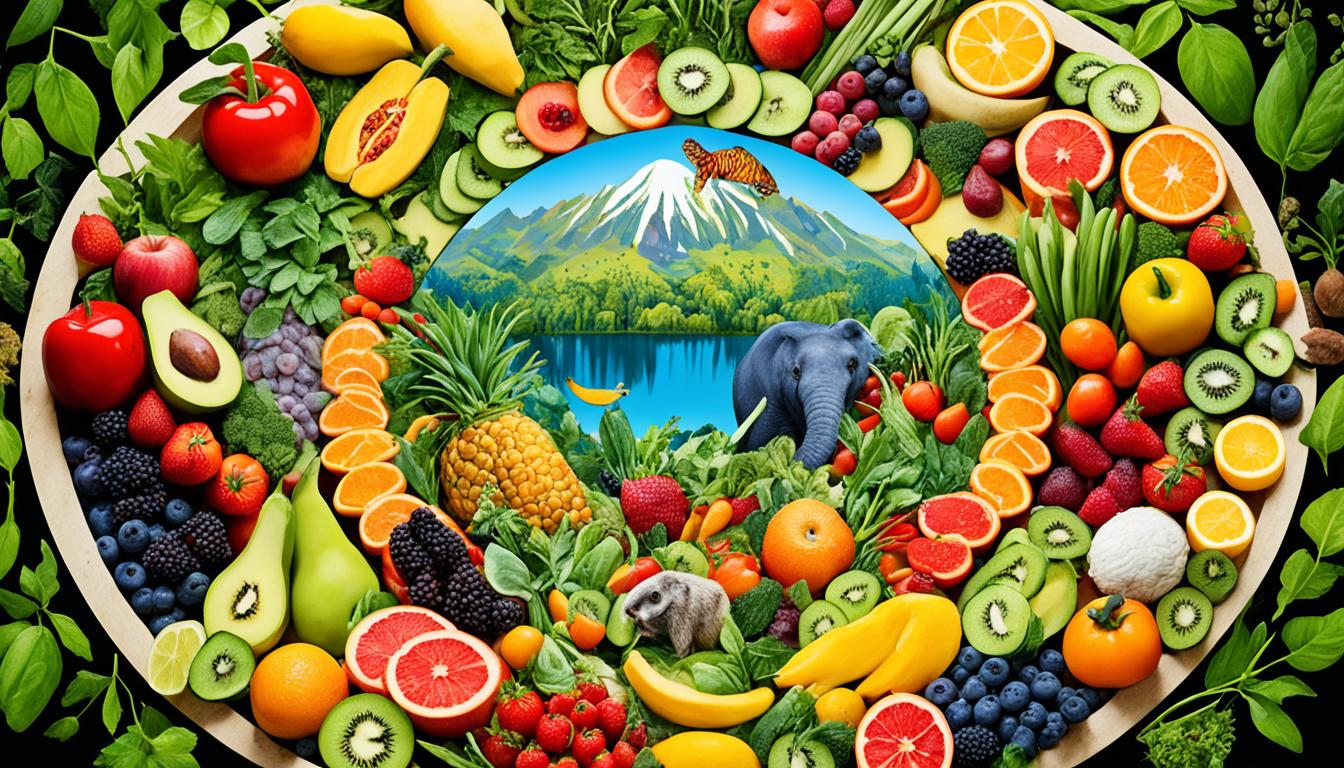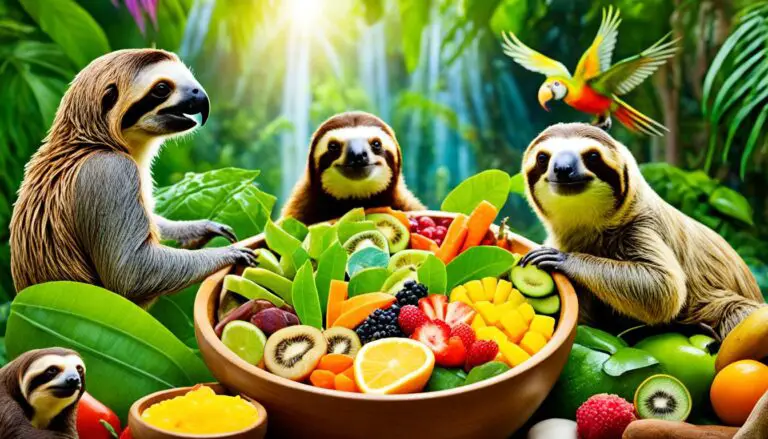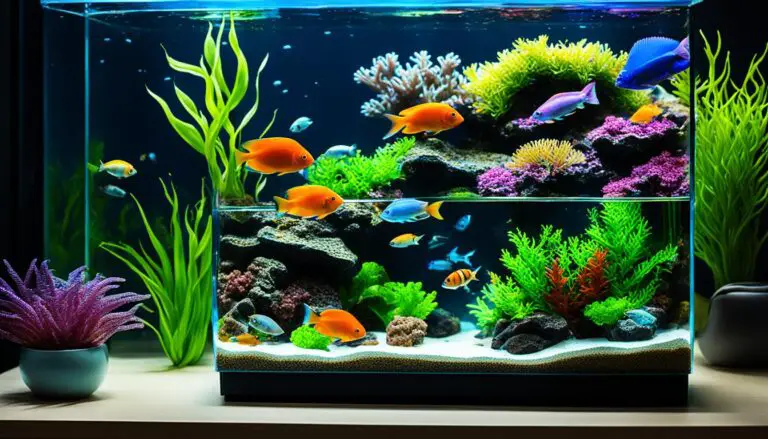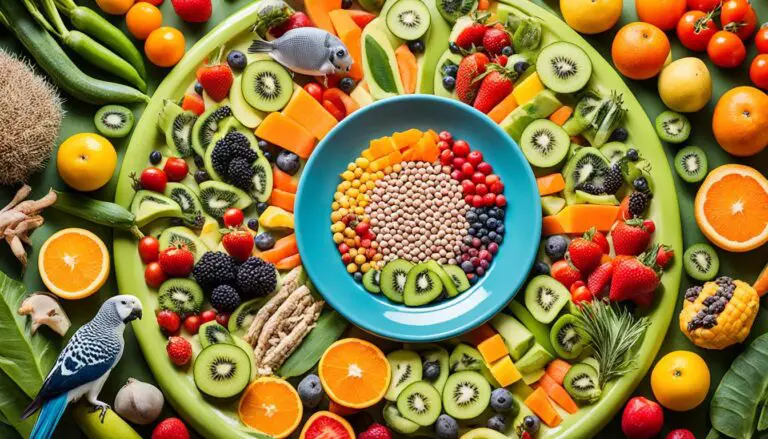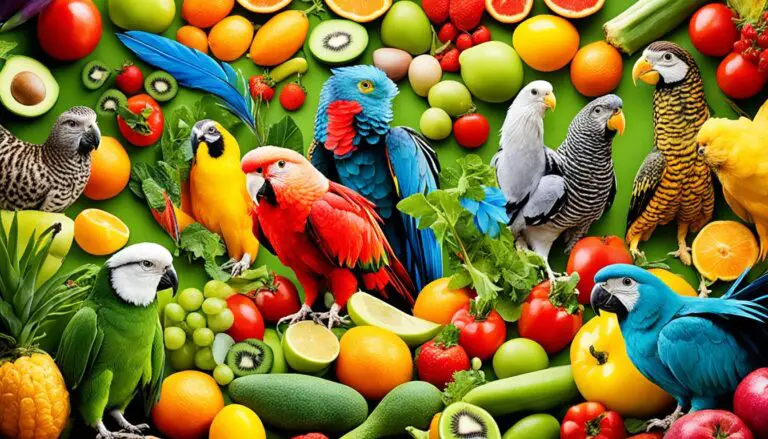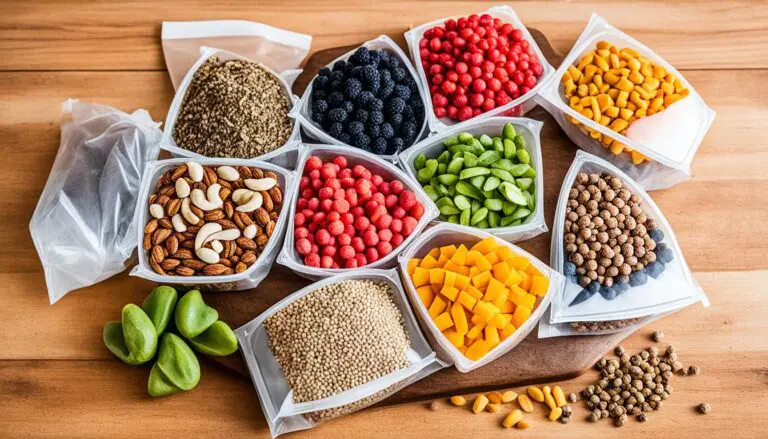Nourishment for Breeding & Lactating Exotic Pets
Proper nutrition is key for breeding and lactating exotic pets. The right nutrients are crucial from conception through the postpartum phase. This ensures both the mom and her babies are healthy. Knowing what these pets need to eat during this time helps ensure successful reproduction and the health of the young. Let’s dive into the special dietary needs for breeding and lactating exotic pets.
Key Takeaways:
- Proper nutrition is crucial for the successful breeding and lactation of exotic pets.
- Understanding the specific nutritional requirements during pregnancy and lactation is essential for optimal reproductive outcomes.
- Feeding strategies should be tailored to meet the unique needs of different species during these critical life stages.
- Inappropriate nutrition can lead to various health issues in breeding exotic pets.
- Consulting with a veterinarian or specialist in exotic pet nutrition is important for developing a suitable diet plan.
Pregnancy Differences Between Dogs and Cats
Nutrition is key for the health of pregnant exotic pets. Even though dogs and cats have similar pregnancy times, their eating needs differ. It’s vital to feed them right for their well-being.
Dogs slowly put on weight in the first five weeks of pregnancy. Most of the puppy’s growth happens later. Cats gain weight evenly over their pregnancy. This affects how we should feed them. Both need different amounts of energy when expecting.
Dogs often get back to their pre-pregnancy weight quickly after birth. Yet, cats usually stay heavier because of how much they need to eat when nursing. Cats must get enough food during this time. This helps their kittens grow strong.
When it comes to exotic pets having babies, ask a vet or an exotic pet nutrition expert about the right diet. Good food during pregnancy helps pets be healthy and successful parents. So, tailored nutrition is a must for these pets.
Key Elements of Feeding Management During Pregnancy
When exotic pets are pregnant, their nutrition is very important. A good diet supports their health and helps the babies grow. They need a mix of nutrients to breed successfully and stay healthy.
Things like protein, fat, calcium, and phosphorus are crucial during pregnancy. The Association of American Feed Control Officials (AAFCO) guides these needs. It’s best to use special diets made for pregnant animals. These diets have all the necessary nutrients.
Tip: Using a special diet for pregnant animals is a smart choice. It meets all their nutrition needs.
Every animal has its unique needs. For example, dogs should have folic acid. It helps prevent some health issues during pregnancy. Cats need taurine for their well-being while they’re expecting.
Adding essential fatty acids to the diet can boost the babies’ health. EPA and DHA are good for brain and eye growth. They make sure the newborns are healthy.
Feeding Strategies for Exotic Pets During Pregnancy
As pregnant pets’ bodies change, so do their needs. They need more energy, especially later in pregnancy. Giving them small meals throughout the day is better than a few big meals.
Watching the pregnant animal’s weight is crucial. Too much food can make them gain too much weight. This could cause problems at birth.
A healthy, balanced diet helps pregnant exotic pets. Their needs are very specific. It’s wise to talk to a vet or a nutrition expert for advice on what to feed them.
| Nutrient | Recommended Daily Intake for Pregnant Exotic Pets |
|---|---|
| Protein | Varies depending on the species. Consult with a veterinarian for specific recommendations. |
| Fat | Varies depending on the species. Consult with a veterinarian for specific recommendations. |
| Calcium | Varies depending on the species. Consult with a veterinarian for specific recommendations. |
| Phosphorus | Varies depending on the species. Consult with a veterinarian for specific recommendations. |
| Folic Acid | Consult with a veterinarian for specific recommendations. |
| Taurine | Consult with a veterinarian for specific recommendations. |
| EPA and DHA | Consult with a veterinarian for specific recommendations. |

Proper nutrition is key for a pregnant exotic pet’s health. By sticking to expert advice, you can give them the best chance at a healthy pregnancy. This supports their babies’ health too.
Pregnancy-Associated Diseases Related to Inappropriate Nutrition
During pregnancy, bad eating habits can seriously harm exotic pets. It’s vital to feed them right to avoid health issues. Wrong nutrition can cause several diseases like dystocia, decreased uterine contractions, and pregnancy toxaemia.
- Dystocia: This happens with overweight animals. It makes labor hard because of too much body weight. It may need a vet’s help to ensure a safe birth.
- Decreased Uterine Contractions: Giving too much energy to pregnant dogs can lower contractions. This slows down labor and might need medical help.
- Pregnancy Toxaemia: A lack of carbohydrates can lead to this issue in pregnant dogs. They need quick vet care to manage and avoid problems.
It’s very important to watch the weight and food of pregnant animals. A balanced diet helps prevent these serious diseases. Breeders can keep their exotic pets safe and healthy by feeding them the right way.
Common Pregnancy-Associated Diseases in Breeding Exotic Pets
| Disease | Cause | Prevention | Treatment |
|---|---|---|---|
| Dystocia | Overweight animals | Maintain healthy body weight through proper nutrition and exercise | Veterinary intervention during delivery |
| Decreased Uterine Contractions | Excessive energy intake | Provide appropriate energy levels during gestation | Medical assistance to ensure a smooth labor process |
| Pregnancy Toxaemia | Lack of carbohydrates or altered carbohydrate metabolism | Ensure a well-balanced diet with adequate carbohydrate intake | Immediate veterinary attention and management |
General Feeding Management During Lactation
Lactation is tough on exotic pets, with their need for food going way up. This is when mothers eat 1-3 times more than usual to keep up with the energy they need. They want the most food about three to four weeks after having babies.
Mom pets should get a super easy to digest, packed-with-nutrients diet. These meals are made to help them make top-quality milk and grow healthy babies.
Drinking lots of water is key for making milk. It’s a good idea to let nursing pets drink as much water as they want. This keeps the mom and babies well-hydrated.
Feeding right during lactation is key for pets’ health and happiness. With the right food, pets can make enough milk and raise strong babies.

Lactation Feeding Guidelines
| Feeding Guidelines for Lactating Exotic Pets: |
|---|
| 1. Provide a highly digestible, nutrient-dense diet formulated for growth or performance. |
| 2. Offer 1-3 times the maintenance energy requirements during lactation. |
| 3. Feed smaller, more frequent meals to accommodate the increased energy needs. |
| 4. Ensure access to fresh water at all times. |
| 5. Monitor the body condition and adjust the diet accordingly to maintain optimal weight and health throughout lactation. |
Nutrients Influencing Lactation
In the lactation period, key nutrients are vital for the health of exotic pets and their young. It’s critical to have these nutrients in their diet. This ensures they grow well and the mother is healthy. Here are key nutrients you should think about:
- Protein: Neonates need enough protein for growth and milk. Lean meats, fish, and eggs supply this protein. They help meet the body’s extra needs during lactation.
- Fat: Fat is crucial for energy in exotic pets that are lactating. It helps in milk production and keeps the mother healthy. Including omega-3 fats from fish oil aids the growth of cognitive and visual skills in young animals.
- Carbohydrates: Carbs are the primary energy source for nursing mothers. They meet the high energy demands. It’s good to include complex carbs from whole grains, veggies, and fruits in their diet.
- Calcium, Vitamin D, and Phosphorus: These are vital for bone and teeth development in young ones. Calcium, especially, is important during lactation. It passes from mother to young through milk. Include dairy, green leafy veggies, and fortified foods for these nutrients.
- Taurine: For cats, taurine is key, helping in reproductive health. It supports lactation and overall reproductive function.
Nutritional Variety for Optimal Lactation
A diet that supports lactation needs to be varied and nutrient-rich. Include lean meats, fish, eggs, fruits, veggies, and grains. Special commercial diets for lactating pets can also help. They meet specific nutritional needs.
“Adequate protein, fat, carbohydrates, calcium, vitamin D, phosphorus, and taurine are crucial for supporting lactation in exotic pets.”
Also, talking to a vet or an exotic pet nutrition specialist is wise. They ensure the diet is right and suggests supplements when needed.
Nutrition for other Exotic Pets
Research mostly covers breeding and nursing in dogs and cats. But, other exotic animals need special diets too. Their nutritional needs change when they are breeding or nursing. It’s vital to pick the right food to keep them healthy.
Small Herbivorous Mammals
Rabbits, guinea pigs, and chinchillas need a lot of fiber. They should eat high-quality hay, fresh veggies, and some pellets or commercial food. Foods high in sugar and fat are bad for them. Avoid these to prevent health problems.
Birds
Different birds need different foods based on where they come from. A balanced bird diet has fruits, veggies, seeds, and pellets. They also need fresh water all the time. Always check with a bird expert or a vet for the best diet for your feathered friend.
Reptiles
Reptiles eat different foods based on their type. Some eat plants, needing lots of greens and veggies. Others eat meat and need suitable prey. You should know your reptile’s natural diet and try to match it. Offering calcium and vitamins can also help keep them healthy.
Carnivorous Birds and Omnivores
Some birds and exotic animals eat meat or a mix of food. They need the right balance of prey, fruits, veggies, and grains. Consulting with an expert in exotic pet diets is smart. They can help you make a good diet plan for your pet.

Proper Feeding for Breeding and Non-Breeding Life Stages
Exotic pets need different foods as they grow. For pets not breeding, stick to a regular, balanced diet. It must have all needed vitamins and minerals, plus the right levels of protein, carbs, and fats. An exotic pet nutrition expert can help you with this. They will point you to the best commercial food or homemade diet.
When exotics are breeding, they need a lot more energy. It’s important to switch their diet. Offer special foods made for breeding times. These foods are rich in protein, fat, and nutrients for healthy babies. Always listen to what nutrition experts say about feeding your pets during this critical time.
During breeding, how much and how often you feed is crucial. A vet or nutrition specialist can give you advice. They may recommend special nutrients and supplements too. Getting help from these pros ensures your exotic pets get what they need for a successful breeding period.
Dietary Adjustments for Non-Breeding and Breeding Life Stages
| Life Stage | Nutritional Considerations |
|---|---|
| Non-Breeding |
|
| Breeding |
|
Feeding right is key for all stages of your pet’s life. Follow advice from nutrition experts closely. By doing so, you’ll support your pet’s health every step of the way. Don’t forget to keep an eye on their weight and body shape. Adjust their food as needed. Your goal is to give them a diet that meets all their unique needs.
Potential Health Issues Related to Incorrect Nutrition
Giving exotic pets the wrong food can harm their health. It can make them too fat, give them tooth problems, stomach issues, and lack of nutrients.
Exotic pets need the right food to stay healthy. If they get too fat, it can cause pain and heart issues. They might also not live as long. Diets without enough nutrients can hurt their immune system and growth.
Bad nutrition can also hurt their teeth. Without the right food textures or dental care, they might get teeth diseases. This can make eating hard and painful for them.
If exotic pets eat wrong, they might have tummy troubles. This can include not enough fiber or sudden food changes. They might get sick, have tummy pain, or need a vet’s help.
Exotic pets might not get all the nutrients they need from a bad diet. Different pets need different foods to stay healthy. Not enough vitamins or minerals can mean they don’t grow right, get sick easily, and feel weak.
“It’s really important to teach pet owners how to feed their pets right. This can stop many health issues and keep exotic pets happy and well.”
Making sure exotic pets eat well is key to their health for a long time. It’s important to teach owners to feed their pets what’s best for them. This keeps the pets from getting sick.

Owners need advice from a vet or a diet expert for their exotic pets. The right diet helps the pets stay healthy. This builds a strong bond between the pets and their owners.
Importance of Education and Near-Natural Diets for Exotic Pets
Keeping exotic pets healthy starts with their diet. It’s crucial for owners to know what their pets should eat. This means learning about their natural diets and providing food that’s close to what they would eat in the wild.
When it comes to exotic pets, knowing their nutritional needs is crucial. They require a diet different from common pets. Owners must be aware of these differences.
Exotic pet health relies heavily on their diet. Owners must pick foods that resemble what these animals would find in nature. This way, they get the nutrients necessary for growth and staying healthy.
Learning is key to taking good care of exotic pets. Knowing what your pet should eat and how to prepare those foods is essential. It’s also important to adjust the diet as your pet grows or based on individual needs.
Well-informed owners can meet the nutrition demands of their exotic pets. Giving them a near-natural diet can enhance their well-being and life span.
Benefits of Near-Natural Diets for Exotic Pets
Feeding exotic pets right has many benefits. Their health and energy levels improve. They also get sick less often and grow better.
By mimicking their natural diets, exotic pets do better in captivity. Owners should aim for a diet that’s varied and balanced, including fruits and vegetables, proteins, and food made just for their species.
Any diet changes should happen slowly. This allows the pet’s body to get used to new foods. Regular check-ins with a vet who knows about exotic pet nutrition are also key. They provide advice and help you update the diet when necessary.
Image
Caption: Providing a near-natural diet keeps exotic pets healthy and thriving.
| Benefits of Near-Natural Diets for Exotic Pets |
|---|
| Improved overall health and vitality |
| Reduced risk of nutritional deficiencies |
| Enhanced immune function |
| Promoted growth and development |
| Optimized reproductive function |
Conclusion
Good nutrition is key for breeding and nursing exotic pets to be healthy. Knowing what they need to eat when pregnant, nursing, or not breeding is very important. It helps their bodies work well and their babies grow strong. Talking to a vet or an expert in exotic pets’ diets is smart.
Nutrition for exotic pets is crucial for their well-being and avoiding health problems. They should eat a diet that fits their unique needs. This includes foods with protein, fats, and minerals like calcium and phosphorus. Doing this supports their ability to have babies and raise them well.
It’s also very important to stick to feeding guidelines and know what your exotic pet should eat. This can stop diseases that come from bad nutrition. These diseases might be caused by being overweight, having bad teeth, stomach problems, or not getting enough nutrients. Education about proper nutrition is key for exotic pet owners.
To sum up, what exotic pets eat and how they make babies are closely related. Choosing the right food for different times, like pregnancy or just regular days, is crucial. With the right diet, owners help their pets live longer, stay strong, and be healthy.
FAQ
What are the differences in pregnancy between dogs and cats?
What are the key elements of feeding management during pregnancy?
What pregnancy-associated diseases can be related to inappropriate nutrition?
What is the general feeding management during lactation?
What nutrients are important for supporting lactation in exotic pets?
What should be considered for the nutrition of other exotic pets?
How should feeding be managed during breeding and non-breeding life stages?
What health issues can be related to incorrect nutrition in exotic pets?
How important is education and near-natural diets for exotic pets?
Source Links
- https://www.vettimes.co.uk/app/uploads/wp-post-to-pdf-enhanced-cache/1/nutrition-for-exotics-correct-diets-will-prevent-problems.pdf
- https://www.ncbi.nlm.nih.gov/pmc/articles/PMC7169170/
- https://healthtopics.vetmed.ucdavis.edu/health-topics/canine/nutrition-pregnant-and-nursing-bitch
Peter Stones is the founder of Exotic Pets Place, the leading online resource for exotic pet care information.
With over 10 years of hands-on exotic pet ownership experience, he is deeply passionate about sharing his expertise to help others properly care for their unusual pets.
When he's not writing extensively researched articles or connecting with fellow exotic pet enthusiasts worldwide, you can find Peter at home tending to his own beloved menagerie of exotic animals.

